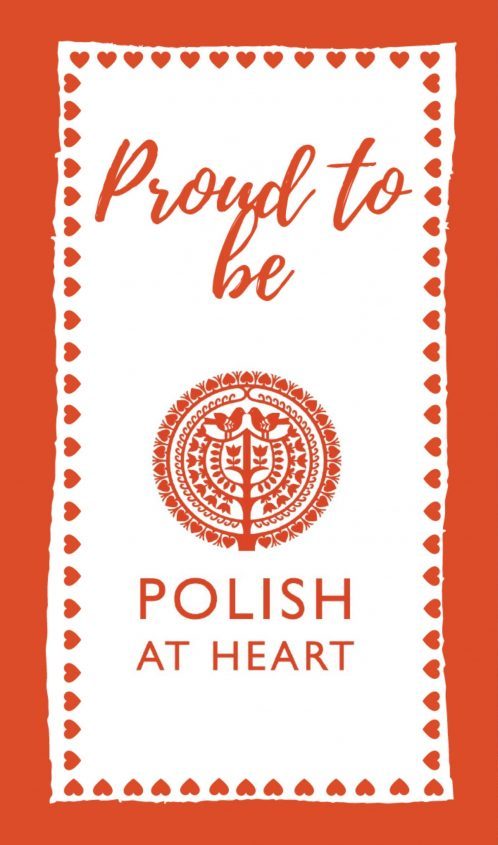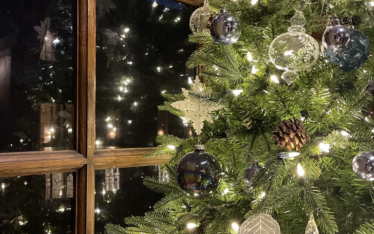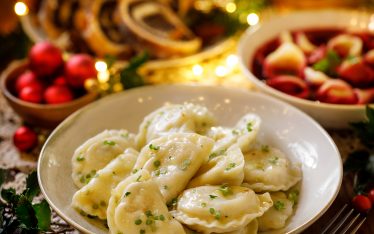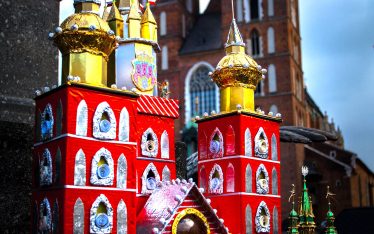As I wish you all Wesołych Świąt and a Happy Christmas, let’s look back at Polish Christmases of the past.
Soon we will sit down to our Wigilia (Christmas Eve) feast, breaking opłatek (Christmas wafer) and wishing each other our heart’s desires. As the aromatic smells of the food we are about to eat surround us, it’s easy to forget that this sharing of opłatek is the very essence of the night and the only sign of Christmas for those in exile through the ages …
The tradition of opłatek stems not only from early Christians sharing bread, but Poland’s traumatic history. When the country was split between three nations in the 18th and 19th centuries, people wanted to express their unity and nationhood, so they started sending opłatek to family members, which was much easier to put in an envelope than real bread. Sharing opłatek, which is similar to communion bread, is a very personal experience. Each person picks a wafer and shares pieces with everyone else, wishing happiness, asking forgiveness or just thanking them for being who they are. This night is an opportunity to heal old rifts and start anew. Cyprian Norwid, one of Poland’s 18th century poets, summed up what it means for Polish people.
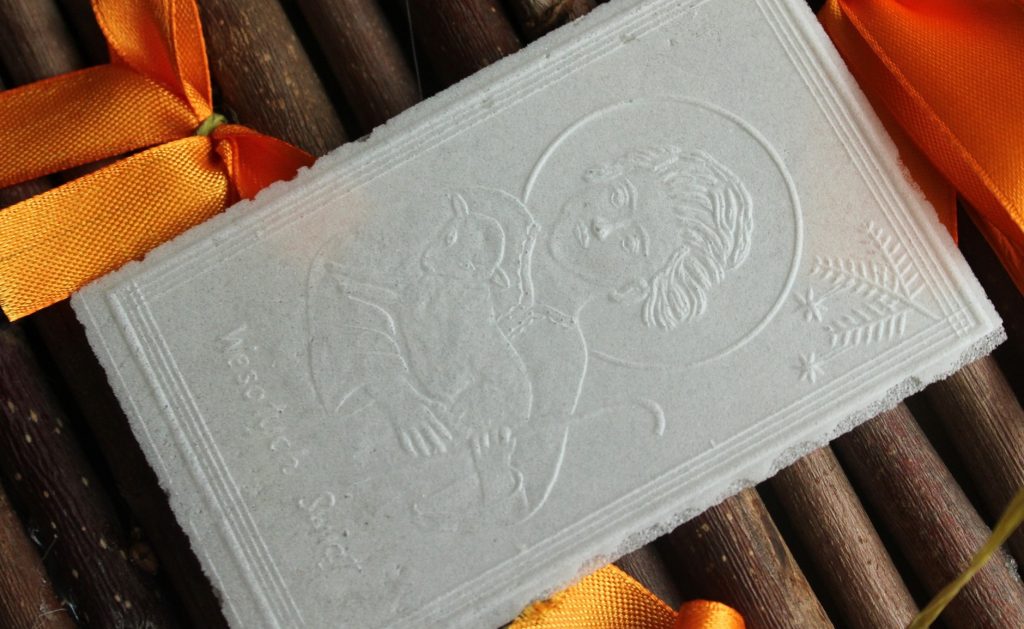
Opłatek
Jest w moim kraju zwyczaj, że w dzień wigilijny,
Przy wzejściu pierwszej gwiazdy wieczornej na niebie,
Ludzie gniazda wspólnego łamią chleb biblijny
Najtkliwsze przekazując uczucia w tym chlebie.
There is a custom in my country that on Christmas Eve,
At the rising of the first evening star in the sky,
people of our homeland break biblical bread
conveying with it the most tender of feelings.
Siberia 1940s
People like my father and family, deported to Siberia in 1940 for nothing more than being Polish, had to spend Wigilia working, as the USSR did not acknowledge religious festivals. Stanisław Sznajder from Lwów recalled his first painful Christmas in exile:
„Przyszedł dzień wigilijny, ojciec trzymał w ręku kromkę czarnego chleba, a wszyscy płakali. To był moment, który zapamiętałem. To było nasze pierwsze Boże Narodzenie na Syberii. Zima 1940/41 roku była bardzo ostra.
“Christmas Eve came, my father held a slice of black bread in his hand and everyone was crying. This was the moment I remembered. It was our first Christmas in Siberia. The winter of 1940/41 was very severe.
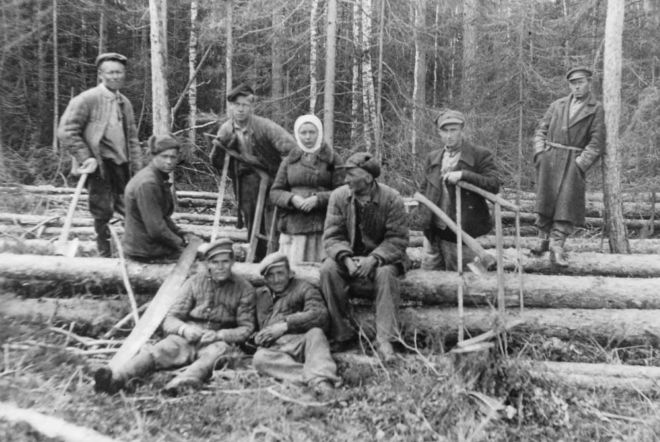
Polish officers at Katyń
22,000 Polish officers were imprisoned and then shot by the Russians in and around Katyń Forest in 1940. When their bodies were exhumed, many personal items were found, such as a diary found in a soldier’s coat, including this extract of the Christmas spent awaiting their fate:
„Wracając przez las zbieraliśmy gałązki by zrobić choinkę. Sporządził ją Major Podolski. Dziś Wigilia, opłatek zrobiony przez kolegów, stół nakryty prześcieradłem – choinka malutka ubrana piernikami i papierosami. Pokój mój – 40 kolegów – dzielimy się opłatkiem i wśród szlochów i łez z calą duszą i sercem rwie się każdy z nas do najdroższych.
“Returning through the forest we collected branches to make a tree. Major Podolski put it together. Today we had Wigilia, my colleagues had made opłatek, the table was covered in a sheet, the small tree dressed with little gingerbreads and cigarettes. In my room of 40 friends, we shared opłatek and through sobs and tears each of us dreamed with heart and soul of our dearest. “
Source: Adam Cyra http://www.podkarpackahistoria.pl/2015/12/wigilia-przed-egzekucja/
Polish Legions
When Poland was thrust into World War I by it’s occupying forces, many Poles were stuck in opposing enemy trenches. At Christmas in many places, carols were sung in Polish from Austrian, Russian and German trenches, soaring together towards the skies above, where war didn’t exist. The Polish legions, formed to fight alongside the Austrians in the hope of a return to an independent Poland, wrote their own carols, telling of their fate.
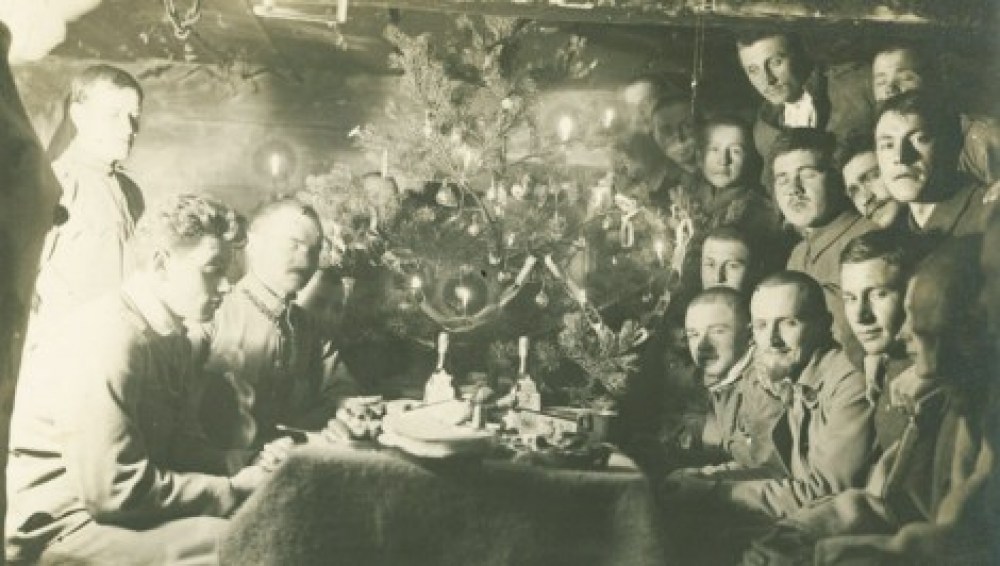
Christmas Eve in the trenches – 1st Infantry Regiment Polish Legions in Karasin, Wołyń. 1915
Wigilijną nocą świetny cud się iści i gwiazdy migocą świetniej uroczyście
Tam u mojej matki bieleją opłatki… Hej! Kolęda, kolęda.
A oni się w rowy strzeleckie zaszyli,wśród strzałów rozmowy swe święta przebyli
Boje mieli krwawe, z wrogiem ciężką sprawę.Hej! Kolęda, kolęda
On Christmas Eve, a great miracle is happening, and the stars are shining brighter, solemnly
There at my mother’s the wafers are turning white. Hey! Christmas Carol, Christmas Carol.
Holed up in infantry trenches with sounds of shots their Christmas spent.
Their weapons bloody, a difficult enemy. Hey! Christmas Carol, Christmas Carol.
1864 Siberia and Deepest Russia
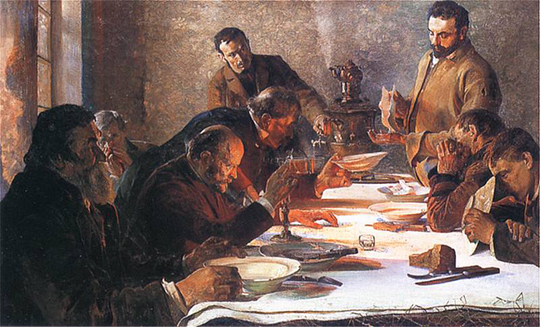
Many people were sent to Siberia after the January Uprising of 1863 against the Russians. Jacek Malczewski painted “Wigilia na Syberii” (1879), creating his own vision of human despair and suffering, each man focused on his own pain. Ludwik Niemajowski, sentenced to 10 years in deepest Russia for helping wounded Polish insurgents at his estate in Radoszewice wrote this to his family:
„W pierwszych latach mojego tu pobytu (…) organizowaliśmy wtedy razem wigilijną wieczerzę, łamaliśmy w miejscu opłatka chlebem i życzyliśmy sobie wzajemnie lepszej przyszłości. Jeden drugiego podtrzymywał w nadzei i odwadze. I było jakoś raźniej na sercu.”
“In the first years of my exile (…) we would organise a Christmas Eve feast, breaking bread instead of opłatek and wishing each other a better future. We supported each other with hope and bravery. And our hearts felt somehow brighter. “
It was after this uprising, that the empty plate at the table began to be set for a missing member of the family who had been deported to the east. By remembering them in this way, there was a chance they’d get back home some day.
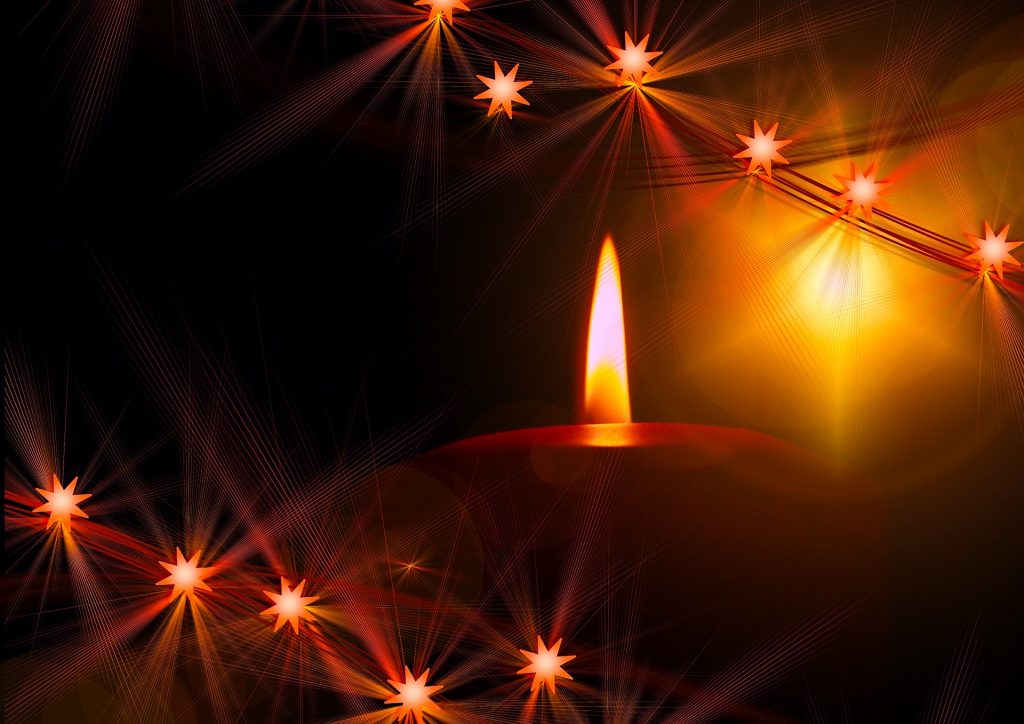
There are many emotions during Wigilia, when we are intensely aware that people who always sat with us at the table, are gone. Tears in one’s eyes are just part of this magical, silent night, when time seems to stop and as we share opłatek we become one with them, with every other Pole doing exactly the same that evening, whether it is now, last year or in the last century. The preciousness of this tradition is what keeps it uniquely ours.
Wishing you all a Christmas full of joy, of pride in our heritage and traditions and a gratefulness to previous generations for keeping them alive and the unique, unifying experience of sharing opłatek.
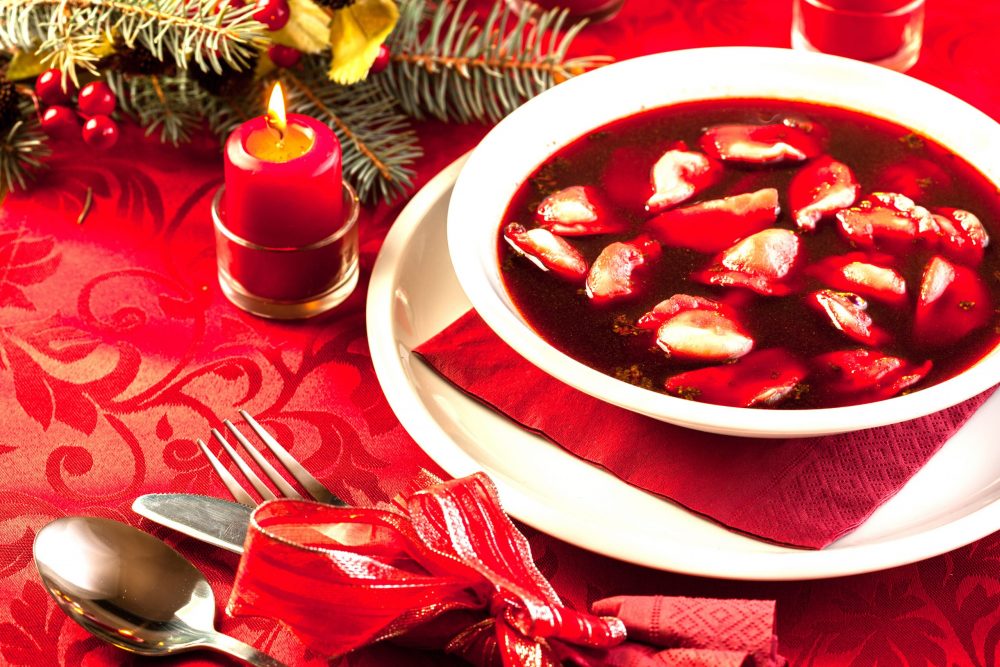
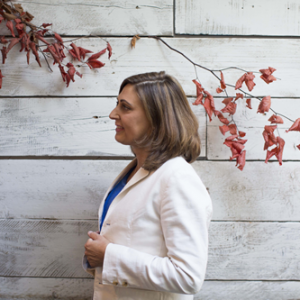
 1.Tracing Family History pre-WW2
1.Tracing Family History pre-WW2 2. Tracing Family History WW2
2. Tracing Family History WW2